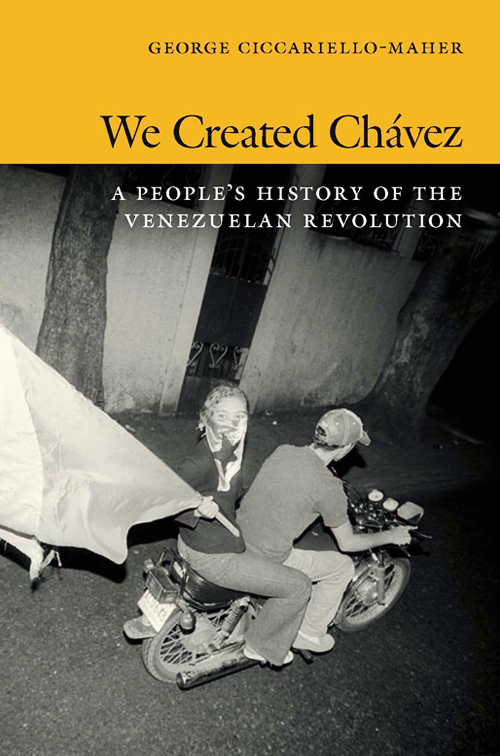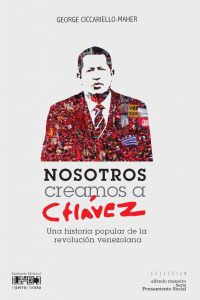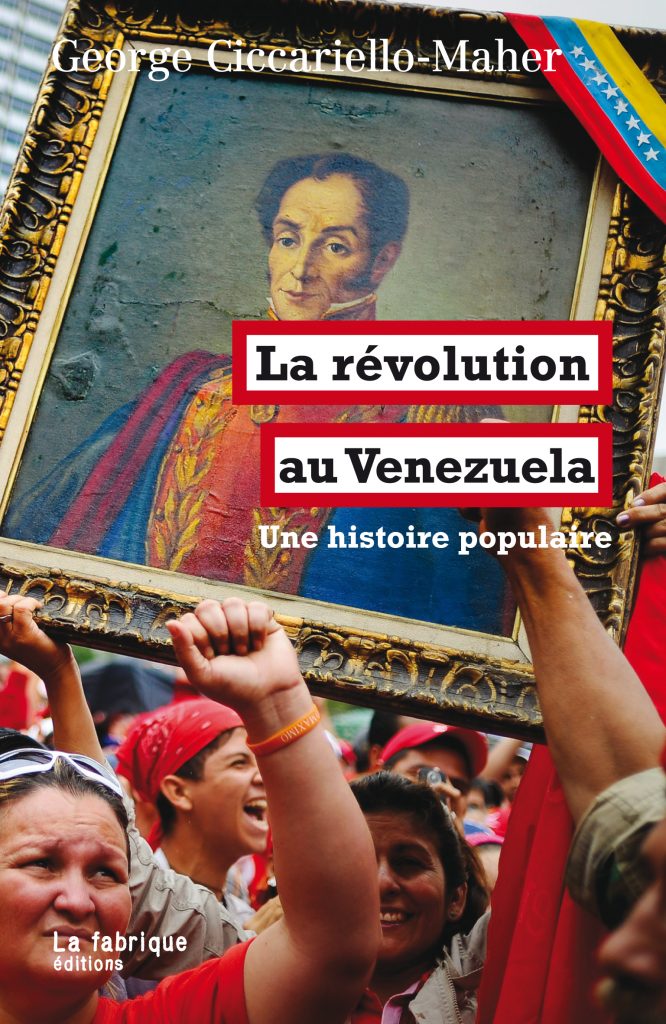WE CREATED CHAVEZ

Available from DUKE UNIVERSITY PRESS
Available in Kindle format from AMAZON
First Spanish edition available from EL PERRO Y LA RANA AMAZON (Caracas, 2017)

French edition available from LA FABRIQUE (Paris, 2016)

Since being elected president in 1998, Hugo Chávez has become the face of contemporary Venezuela and, more broadly, anticapitalist revolution. George Ciccariello-Maher contends that this focus on Chávez has obscured the inner dynamics and historical development of the country’s Bolivarian Revolution. In We Created Chávez, by examining social movements and revolutionary groups active before and during the Chávez era, Ciccariello-Maher provides a broader, more nuanced account of Chávez’s rise to power and the years of activism that preceded it.
Based on interviews with grassroots organizers, former guerrillas, members of neighborhood militias, and government officials, Ciccariello-Maher presents a new history of Venezuelan political activism, one told from below. Led by leftist guerrillas, women, Afro-Venezuelans, indigenous people, and students, the social movements he discusses have been struggling against corruption and repression since 1958. Ciccariello-Maher pays particular attention to the dynamic interplay between the Chávez government, revolutionary social movements, and the Venezuelan people, recasting the Bolivarian Revolution as a long-term and multifaceted process of political transformation.
REVIEWS
“We Created Chávez provides a systematic, bottom-up approach to Venezuelan politics from 1958 to the present. It offers a much-needed new perspective on Hugo Chávez’s rise to power. Writing in a lively style and demonstrating a thorough command of the issues and personalities in recent Venezuelan history, George Ciccariello-Maher has produced a book essential to understanding the phenomenon of ‘Chavismo,’ which has attracted widespread interest throughout the world.”—Steve Ellner, author of Rethinking Venezuelan Politics: Class, Conflict, and the Chávez Phenomenon
“In the United States, accounts of Venezuela have been fixated on the figure of Hugo Chávez. We Created Chávez breaks with this obsession, instead showing the dynamic and contradictory relationship that exists between Venezuela’s president and the social forces that gave rise to and sustain the government. It is required reading for anyone wishing to understand the internal dynamics of social change underway in Venezuela today.”—Miguel Tinker Salas, author of The Enduring Legacy: Oil, Culture, and Society in Venezuela
“Ciccariello-Maher’s history of the Venezuelan left is essential to understanding the Chávez era.”—Dorothy Kronick, The New Republic
“Terrific.”—Greg Grandin, The Nation
“[A] crisply written social and political history of the critical decades leading up to Chávez’s election in 1998. . . . For those who want to see the revolution continue, Ciccariello-Maher has made a critical contribution to our understanding, which is in and of itself enough to recommend this book without reservation. But more than that, We Created Chávez brilliantly demonstrates how social history scholarship can mine the lived experiences of rank-and-file activists and radical leaders for precious stones, and then set those gems in a visible and rigorous theoretical frame that allows us to see history in motion.”—Todd Chretien, Socialist Worker
“I’ve been looking for this book for years.” — Steve Henshall, Socialist Review
“In addition to providing readers with an irreplaceable genealogy of the Revolutionary Left in Venezuela and its role in the making of the present, We Created Chávez deftly illustrates the tensions between constituent and constituted power that make the Bolivarian Revolution a dialectical process rather than a presidential term in office. We Created Chávez is also a masterful contribution to a thankfully growing body of work responding to dominant portrayals of the Bolivarian process in Venezuela enraptured or enraged by the figure of el Comandante.” — Donald V. Kingsbury, Theory & Event
“In We Created Chávez, George Ciccariello-Maher offers a masterful ‘people’s history’ of Venezuela…. Through Ciccariello-Maher’s analysis, a Venezuela easily and often ignored both by academia and by the popular press becomes visible. It is this Venezuela from which post-Chávez popular politics will be forged; Ciccariello-Maher offers valuable insight into what the coming years may bring.” — Erica S. Simmons, Latin American Politics and Society
“A wide-ranging, in-depth and sophisticated exploration and analysis of Venezeulan social movements and revolutionary groups active before and during the Chávez era . . . Rather than focusing on the commanding heights of political power, We Created Chávez seeks to demystify Venezuela’s complex revolutionary process by highlighting its largely subterraneous history – a history that has only recently emerged into the light of day, and to which this book is a big contribution.” — Nick Southall, Green Left Weekly
“Blending ethnography with political history and theory, the vignettes of We Created Chávez trace the stages and shapes of popular struggle that punctuated Venezuelan politics, from the establishment of electoral democracy in 1963 to the explosion of the masses onto the political terrain at the end of the century.” — Patrick Madden, Lana Turner
“Ciccariello-Maher’s book, important in its own right, is part of a new stream of scholarship that downplays the role of Hugo Chávez the man and gives greater attention to the supporters of the Bolivarian Revolution.” — Anthony Peter Spanakos, Public Books
“The book is a fascinating look into Venezuelan politics and clearly shows how it was the strength of the mass movement that created Hugo Chávez, not the other way around. Written before Chávez’ death, the author doesn’t directly address the question of what will happen without him; however, the degree of popular mobilization he describes is reassurance that the revolution will continue.” — Mike Wold, Real Change
“In its endeavor to look beyond Chavez, the book offers invaluable lessons to people anywhere in the world who wish to contribute to democratic revolutions.” — Joe Emersberger, Venezuela Analysis
“We Created Chavez contributes enormously to understand Venezuela today, what is going on in the country, the Bolivarian process, the person Chavez and the question haunting us: will Chavismo survive and Venezuela continue in the path proclaimed by Chavez. Ciccariello-Maher … does an excellent job in acquainting the reader with the history of Venezuela – the peoples’ history. What makes the book an absorbing read is that, he concentrates extensively on the movements and struggles that laid the conditions for Chavismo, rather than on Chavez himself. This is an interesting departure from many of the narratives that are emerging from the continent, ever since Chavez had brought Venezuela, an obscure, far-off country into the everyday discussions of everyone who is concerned for a better future.” — R Arun Kumar, People’s Democracy
“We Created Chávez is indispensable toward understanding the process that is the Bolivarian Revolution and the path taken by Venezuela.” — Systemic Disorder blog
“Ciccariello-Maher’s book constitutes a relevant contribution for understanding the genesis and present of Venezuelan politics; with fluid prose and a narration that oscillates between interviews with the protagonists of social movements, testimonial, and historiographic research… this book has the merit of constituting an unavoidable reference-point for recent American History.” — Lucas Benielli, Rey Desnudo (translated from the Spanish)
“A much needed correction that gets away from the over-mediated celebrity worship of political leaders, and focuses instead on the grassroots and popular voice. . . . That the media focus on the bourgeois classes demands for ‘freedom’ should not surprise us; I lived this in Lebanon as much as the pages of this book resonate coming as they do from Venezuela. The struggle is global; the resistance is local. An excellent read.” — Daniel Ibn Zayd, Inquistor
“This book makes a significant contribution to the debates on contemporary Venezuelan politics. . . . Its main contribution rests precisely in its focus on the trajectories of revolutionary collectives and activists during the Fourth Republic. Their self-accounts of the country’s political history and the role they played in shaping it underpin the book’s arguments and, refreshingly, the author elicits a good share of those accounts from his own interviews to key activists.” — Luis F. Angosto-Ferrández, Journal of Iberian and Latin American Research
“We Created Chavez is likely to be a point of reference for anyone seeking to assess chavismo as a seminal case of popular resistance to neoliberal globalization, as well as its relevance to twenty-first-century socialism.” — Daniel Hellinger, Hispanic American Historical Review
“If . . . you want an engaging book that, in the service of a revolutionist mythos, narrates the actions and ideas of many people often neglected by scholars, you may appreciate We Created Chavez.” — Jonathan Eastwood, American Historical Review
“[A]n impressive work that locates the Bolivarian Revolution, not directly in the figure of Hugo Chávez, but rather in Venezuela’s diverse and vibrant social movements. . . . the book is a wonderful contribution to breaking stale discussions of state/society relations in revolutionary contexts and should be required reading, not just for students of Venezuela, but also for those of revolutionary societies more generally.” — Katherine A. Gordy, Contemporary Political Theory
“This is an excellent book and I agree with a lot of it. Others might agree with much more than I do. It is well written and a joy to read. It makes you think, and therefore should be read by anyone with an interest in (Venezuelan) politics and government.” — Michael Derham, Bulletin of Latin American Research
“One wants to applaud this book for its stubborn refusal to put Hugo Chavez at the centre of the Bolivarian Revolution. Based on a large number of interviews, political scientist George Ciccariello-Maher is able to invoke the radical autonomy of many of the social movements which make up the popular revolution he describes, the contingency of their allegiance to Chavez, and the willingness of these movements to push beyond the limits that the Venezuelan state wants to impose on the revolution. His willingness to take informal workers seriously in particular is admirable; other scholars would do well to follow his lead.” — Andrew J. Kirkendall, Canadian Journal of History
“It is this recognition—that it is el pueblo that is the heart of the revolutionary process, not an elected leader, not even as one as charismatic as Hugo Chavez—that makes Ciccariello-Maher’s account so important. And this is a tremendously inspiring account, which became even more important upon the death of Chávez in March 2013: by understanding the role of the mobilized people in the proceso, one would know that the proceso was not dependent on Chávez and would continue, although obviously whoever succeed Chávez would propel or hinder the process.” — Kim Scipes, Upside Down World
“We Created Chávez is the single most important book available in English advancing an explicitly anti-capitalist framework for understanding the historical, social, and political conditions underlying the rise of Hugo Chávez and the character of the Bolivarian process to date. For this reason alone, it deserves sustained theoretical and empirical engagement by Marxists. But the book is also unusual in the level of political and historical sophistication it brings to bear on contemporary Venezuela. In many ways, We Created Chávez sets a new standard for scholarship on the Bolivarian process, and one hopes that with its pedagogic and engaging prose style it will reach an audience well beyond the confines of academia.” — Jeffrey R. Webber, Historical Materialism
“We Created Chávez is an inspiring examination of social movements and revolutionary groups active before and then during the Chávez era, providing an essential history of the years of activism that preceded it.” — Gavin O’Toole, Latin American Review of Books